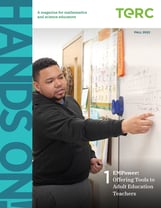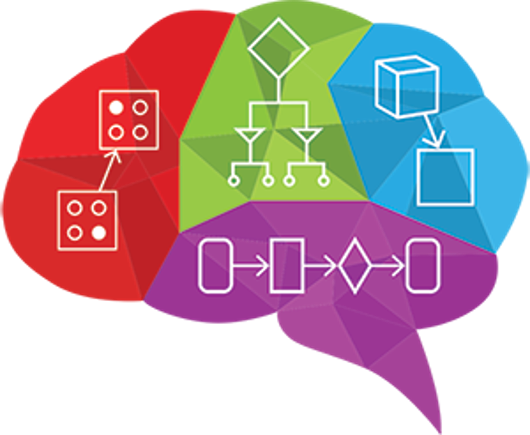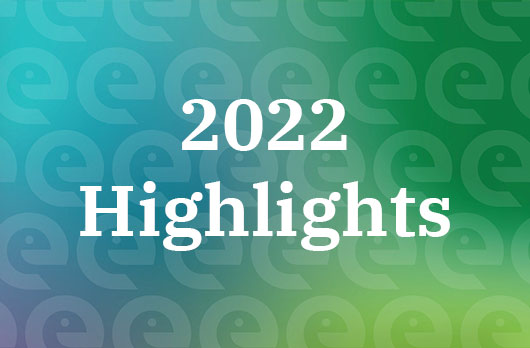TERC Blog
EMPower: Offering Tools to Adult Education Teachers
WHEN I BEGAN TEACHING IN ADULT EDUCATION IN GEORGIA IN 2006, I was given multiple classes spread across three counties and three different programs. None were leveled by assessment scores, so students reading on a third-grade level were mixed with students reading at a ninth-grade level. I was told I would be teaching all five subjects on the GED: Reading, Writing, Math, Science, and Social Studies. My new boss pointed to a wall of thrift store bookcases weighed heavily with aging, mismatched booklets and told me I could use those for my lessons, but that most materials would have to be shared because there weren’t enough copies to go around. She left the room with a smile of deep gratitude that I’d accepted this part-time teaching job.

That was my introduction to the world of teaching in adult education. Unfortunately, things have not changed all that much since then. The uncertainty and lack of structure in instructional materials and classes, inadequate working conditions, lack of professional development and proper training, and minimal administrator and/or collegial support (Smith & Hofer, 2003) led to many new teachers leaving after two years or less (Adult Education Teacher Demographics and Statistics in the US, 2022.)
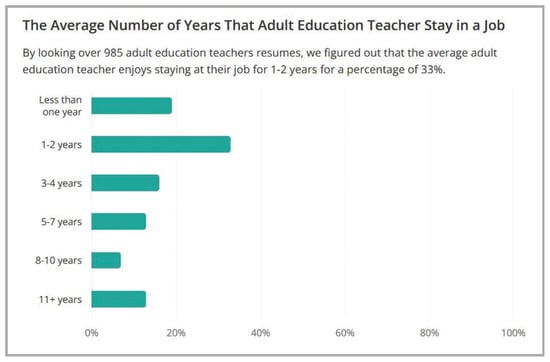
To be honest, I didn’t expect to stay long myself. That all changed in 2010 when I was invited to participate in the pilot of the Adult Numeracy Instruction — Professional Development training (ANI-PD). It was during this intensive series of three two-day institutes that I was finally given the right tools, instructional routines, and training to do more for my math students than I ever imagined possible.
Prior to ANI-PD, I’d considered myself a decent math teacher, but I soon realized I could be doing so much more, especially around teaching math conceptually, i.e., explaining the why and not just the how behind the math. The best part of AN-IPD was that I not only learned how to teach math with a focus on conceptual understanding, but I finally had instructional materials that were designed to teach adults that way. That was my first exposure to the Extending Mathematical Power (EMPower™) book series. I’m still promoting its use more than a decade later.
To say the EMPower books and the ANI-PD transformed my teaching is an understatement. Those experiences shaped my approach to education as a whole and modeled for me the importance of teachers having access to background knowledge and support on guiding students through collaborative learning where the teacher probes for deeper understanding through questions rather than quick solutions. I learned that traditional lecture and drill instruction limited the opportunity for adult learners to apply the collective wisdom they brought to the learning space from their years of experience as workers, consumers, and parents. I learned the teacher was better placed as a guide, armed with the kinds of tools and training that made her feel confident enough to explore math and not just teach procedures the way they had been taught for generations.

Expanding EMPower’s Reach
With TERC’s distribution contract expiring in April 2021, we determined the series could best be served by identifying a new distributor, potentially one with a digital platform to increase accessibility for adult learners. While meeting with potential distributors early in 2021, we also surveyed the adult education field, including current EMPower users, about what they would like to see improved to make the books more user-friendly and a better fit for their program’s needs. Due to the overwhelming shift towards remote instruction with the advent of the COVID-19 pandemic, many respondents expressed the desire for online materials. However, programs were concerned that EMPower’s heavy reliance on manipulatives and collaborative learning made it impossible to use with remote instruction. Teachers working in corrections settings also noted the difficulty of using manipulatives due to security concerns. It was clear that while many longed to go back to face-to-face instruction, the reality was that remote learning was here to stay. EMPower didn’t seem to fit in that kind of instructional setting.
Given this feedback, we narrowed our search for a distributor who could help us expand EMPower’s reach to those teaching remotely and those in need of options beyond printed books and physical manipulatives. In Walch Education, TERC found a partner that not only could handle printing and distribution of the books, but that also had a learning management system (LMS) that could make an online EMPower experience a reality. The LMS, called Curriculum Engine (CE), would allow teachers to assign EMPower lessons, activities, practice, and assessments to students electronically, using CE or other common LMS platforms.
How Curriculum Engine EMPowers Teachers
- All seven titles are now fully-aligned to the College and Career Readiness Standards for Adult Education (CCRSAE) and the eight Mathematical Practices. Every activity, practice page, and test practice is aligned with these.
- All content is now searchable by the CCRSAE, Math Practices, key words, learning type (application, procedural, conceptual), and type of resource (guided activity, practice, assessment).
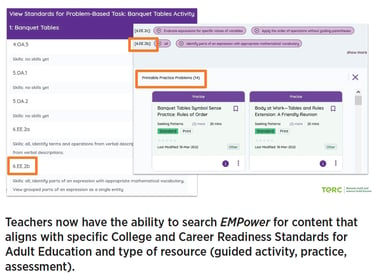
- All Teacher Book (TB) resources for a lesson are now in one place, i.e., all Blackline Masters are attached to the end of the teacher material for that lesson and followed by the Answer Key for the activities in that lesson.
- Student Book (SB) pages are organized directly after the TB resources and can be rearranged into a custom order, including selecting resources that work best for a class, such as Graphic Organizers.
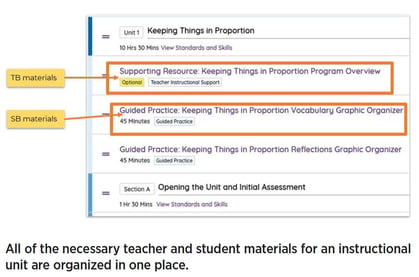
- Teachers can combine activities and practice pages from each EMPower title they have licensed to create a new EMPower course.
- Teachers can add external sources to their EMPower courses, such as OERs like Desmos, virtual manipulatives, or teacher-created content.
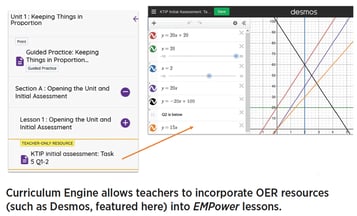
- Teachers can assign start/end dates or specific days of the week for instruction and choose which activities/ practice will be done in class and which will be assigned for homework. All of this is tracked on the teacher schedule in the system.
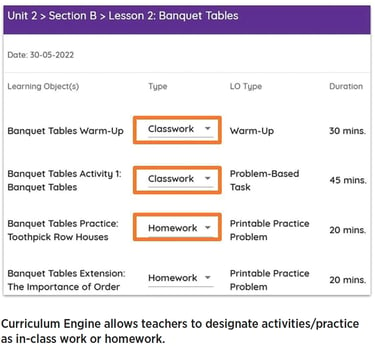
- EMPower courses set up in CE can be exported to a different LMS (including Google Classroom and Canvas) through a Common Cartridge Export feature built into the Course Management Options.
Supporting Teachers
During our earliest CE conversations with Walch, we realized there were some important caveats and considerations we needed to address regarding how much flexibility we wanted to allow in digital books, especially for teachers who were new to teaching math conceptually and might not have access to high-quality PD on math instruction beyond teaching procedures. For example, we knew teachers were excited by the prospect of being able to organize their own digital version of an EMPower “book” with the lessons they teach from various books all in one place. We knew they were interested in organizing the books or specific lessons based on course length, student levels, or specific math content and then loading them into their program’s LMS. However, we also recognized potential pitfalls of giving teachers too much flexibility in pulling apart cohesive lessons aligned to a set of objectives that touched on multiple math topics at the same time. For example, what if teachers only used the practice pages without comprehending and addressing the math concept discovered in the lesson activities? Likewise, what if teachers only viewed the instructional support for an activity without seeing the connection of the activity to the opening and closing student discussions? In the print version, teachers are exposed to all the teacher and student materials owing to the simple fact that the book components are bound together. In a digital version with no restrictions on customization, they might only see the specific pages they selected and potentially miss important concepts and instructional suggestions.
Ultimately, we identified the guardrails we wanted in place to encourage teachers to review the complete lesson, not just certain activities, so they could benefit from understanding the coherence between content and math concepts as they related to all the objectives in a lesson. Walch helped us navigate a balance between meeting the digital needs of instructors while minimizing the pitfalls of allowing too much flexibility when picking and choosing lessons, activities, practice, and assessment.
All the amazing features now available in CE only add to the many supports EMPower always has provided to teachers. What I needed most as a new adult education teacher were cohesive math lessons and engaging math activities that could ultimately become the math curriculum I needed. The EMPower books provided me those things as well as math background, helpful hints, suggested questions, anticipated student responses, sample student work, and a teacher summary. All these supports, coupled with the in-depth ANI-PD training on teaching math conceptually, allowed me to deepen my understanding of math and helped me to enjoy teaching more because the students also saw their math interests and abilities deepen and their confidence soar.

Learn More
Are you interested in what EMPower has to offer you and your students? Download FREE sample lessons from each of the seven titles in the series and hear some student and teacher video testimonials at https://www.walch.com/terc-empower. Visit our FAQ page at https://www.terc.edu/empower/faqs/ for answers to common questions such as which title to use for a specific math level or content need, or how to use EMPower in multilevel classrooms or with students with inconsistent attendance. To learn more about EMPower Professional Development, contact us at https://www.terc.edu/empower/professional-development/ or email empower@terc.edu.
Author
 Heidi Schuler-Jones is the Director of the Adult Numeracy Center at TERC. She has worked in adult education since 2006, spending much of that time expanding her understanding of tools and instructional strategies that make math meaningful, accessible, and fun for adult learners. She manages the SABES Mathematics and Adult Numeracy Curriculum & Instruction PD Center, oversees updates, research, and teacher support for the EMPower math series, and continues to facilitate professional development such as the Adults Reaching Algebra Readiness (AR)2 institutes. At SABES, she was the lead developer of the Curriculum for Adults Learning Math (CALM). She is the president of the Adult Numeracy Network.
Heidi Schuler-Jones is the Director of the Adult Numeracy Center at TERC. She has worked in adult education since 2006, spending much of that time expanding her understanding of tools and instructional strategies that make math meaningful, accessible, and fun for adult learners. She manages the SABES Mathematics and Adult Numeracy Curriculum & Instruction PD Center, oversees updates, research, and teacher support for the EMPower math series, and continues to facilitate professional development such as the Adults Reaching Algebra Readiness (AR)2 institutes. At SABES, she was the lead developer of the Curriculum for Adults Learning Math (CALM). She is the president of the Adult Numeracy Network.
Resources
Adult Numeracy Center (ANC) at TERC https://www.terc.edu/adultnumeracycenter/
Adult Numeracy Instruction–Professional Development training (ANI-PD) https://lincs.ed.gov/publications/pdf/LINCS_ANI_ flyer.pdf
Adult Numeracy Network (ANN)
https://www.adultnumeracynetwork.org/
Curriculum for Adults Learning Math (CALM)
https://www.terc.edu/calm/about-calm/
College and Career Readiness Standards for Adult Education (CCRSAE) https://lincs.ed.gov/professional-development/resourcecollections/profile-521
Teachers Investigating Adult Numeracy (TIAN)
https://www.terc.edu/tian/
Walch Education to purchase curriculum
https://www.walch.com/terc-empower/
Walch Curriculum Engine (CE)
https://www.walch.com/curriculum-engine/ TERC
Acknowledgements
EMPower was made possible with support from the National Science Foundation, Award #ESI-9911410. The original TIAN project was co-developed by TERC and the Center for Literacy Studies at the University of Tennessee and was funded by the National Science Foundation. The materials herein are based on work funded by the National Science Foundation under Grant No. NSF_ESI-0455610.
References
Zippia, The Career Expert (2022, April 22). Adult Education Teacher Demographics and Statistics in the US. https://www.zippia.com/adult-educationteacher- jobs/demographics/
Smith, C., & Hofer, J. (2003). The characteristics and concerns of adult basic education teachers (Report #26). National Center for the Study of Adult Literacy and Learning (NCSALL).

